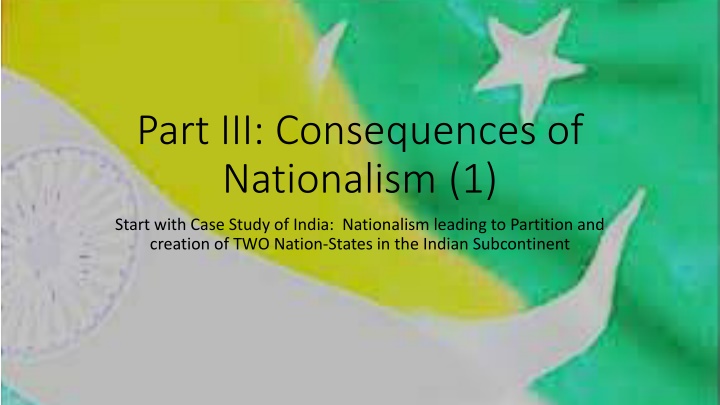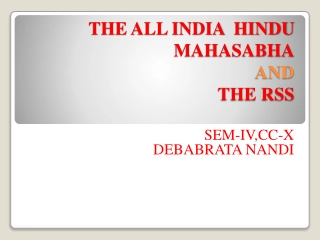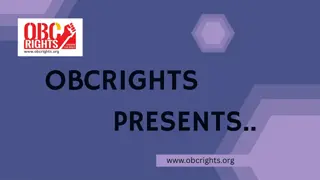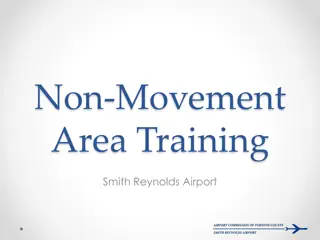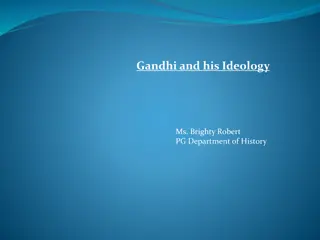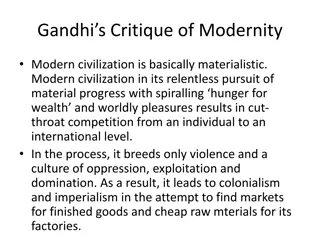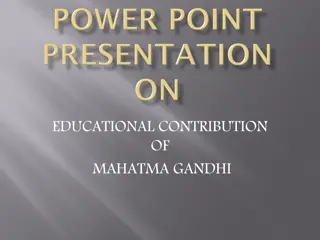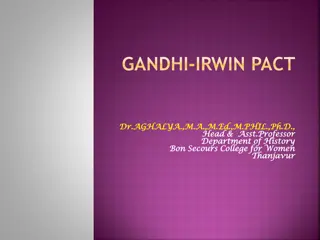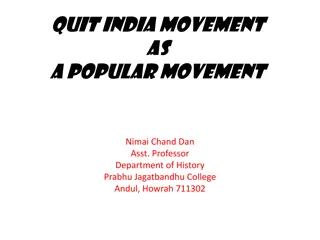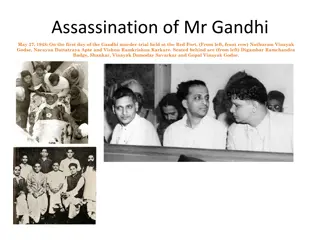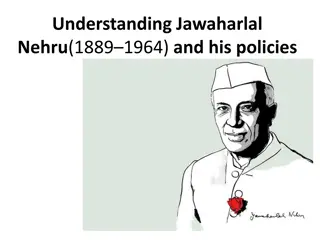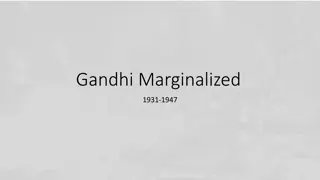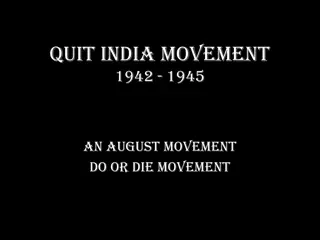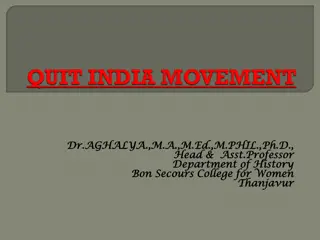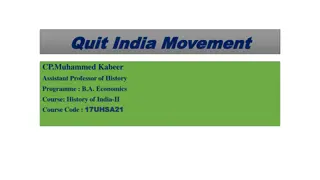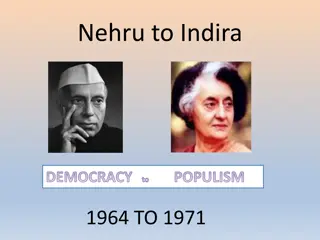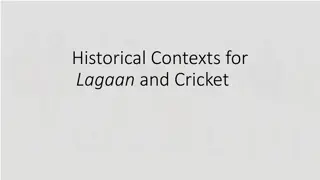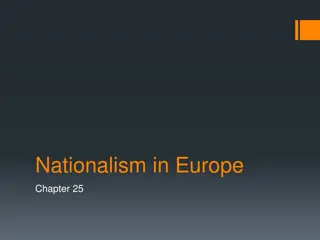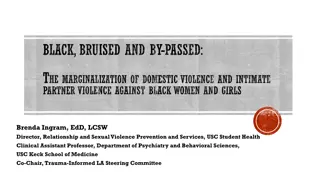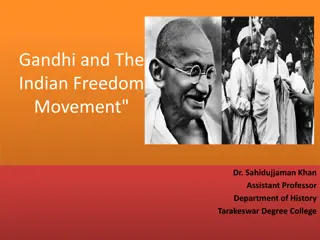The Marginalization of Gandhi in India's Nationalist Movement
Explore how Gandhi's approach to nationalism in India, focusing on inclusive mass movements and power-sharing, led to his marginalization within the nationalist discourse, ultimately influencing the partition and creation of India and Pakistan as separate nation-states. Despite his significant role, concerns about control and changing dynamics within the freedom struggle caused his retreat from active politics, emphasizing his dedication to social reforms over anti-colonial politics.
Download Presentation

Please find below an Image/Link to download the presentation.
The content on the website is provided AS IS for your information and personal use only. It may not be sold, licensed, or shared on other websites without obtaining consent from the author.If you encounter any issues during the download, it is possible that the publisher has removed the file from their server.
You are allowed to download the files provided on this website for personal or commercial use, subject to the condition that they are used lawfully. All files are the property of their respective owners.
The content on the website is provided AS IS for your information and personal use only. It may not be sold, licensed, or shared on other websites without obtaining consent from the author.
E N D
Presentation Transcript
Part III: Consequences of Nationalism (1) Start with Case Study of India: Nationalism leading to Partition and creation of TWO Nation-States in the Indian Subcontinent
The Case of India (and Pakistan): Outline Outline TODAY I. Changing character of NATIONALISM in India: focus on Gandhi, the INC and the Muslim League (ML) II. To see how nationalism of this sort ended up creating not one but two nation- states in the subcontinent, viz. India and Pakistan NEXT CLASS III. How such a transition was made possible: why did the British quit India in such a hurry in 1947 IV. Evaluate the NATURE of the transformation in 1947 V. To point to the consequences of this sort of nationalism for people of India/Pak VI. See how this study of India contributes to a better understanding of nationalism The LEGITIMACY of different KINDS of COMPETING ideas about nationalism What does nationalism DO for the people it claims to represent?
The Marginalization of Gandhi Partition not possible if Gandhian politics remained center-stage because The problem of power sharing between INC and ML was ultimate cause of Partition as well as the shape that it took Background: Gandhi, controlled mass movement Gandhi, Khilafat, inclusive mass movement NOT aimed at control of the state, but anti-state, village republics Gandhi, keep CLASS antagonisms at bay, but that does not REMOVE differences or problems between classes That is why has to act as both mobilizer and brake Repeated calling off of movements despite the sacrifices of people who participate Concerns about movements going out of control That eventually leads to marginalization
Gandhis Marginalization: Specifics Background: Calling off first Non Cooperation Movement 1922, Chauri Chaura But 1930 Salt Satyagraha captures the imagination of people Salt Satyagraha as quintessentially Gandhian moment: Symbolism; no class or religious antagonisms yet anti-colonial; planned in detail; threaten colonial rule Yet 1931 calls off the movement despite nothing like Chauri Chaura, travels to England to attend the second Round Table Conference (RTC) Concerns about control; growing popularity of Bhagat Singh and some no RENT movements Challenge from untouchable leader, B.R. Ambedkar, at RTC, and afterward Tries restart civil disobedience movement 1931 after failure of RTC, no success Colonial government introduce the Communal Award 1932: separate electorates for different religious groups, including Depressed Classes aka Untouchables Gandhi opposes, Ambedkar supports. Gandhi threatens fast to death, compromise reached, Poona Pact Gandhi retreats from active politics, dedicating himself to Harijan [his term for untouchables] uplift Claims this is more important to him than anti-colonial politics
What Partition was NOT (A Religious Divide) Not only a product of Religious PLURALITY Hindus and Muslims together since ca. 700 CE (over a thousand years) COMMUNITY is a PROJECT not a reality. Holds true for the nation too. But especially RELIGIOUS Communities. Divided by CASTE, CLASS, GENDER,REGION, and LANGUAGE among others. THINK before you use categories like The Muslims or The Hindus Who are you referring to? In the way religion is deployed in 1947, it is a product of Colonialism, and Elite (or middle class ) Indian political aims
Partition: High Politics Vacuum of Gandhi s absence filled by others who did not share his anti-state vision, willing to work within the colonial political system Parties like the ML had always been suspicious of Gandhi Important events: {critically important you know these in some DETAIL} 1935 Govt. of India Act: Expands franchise, possibility of some real power 1937 Elections: Sweeping win for INC, debilitating loss for ML, who need to rethink their strategy, realize cannot compete with INC at all-India level 1940 Lahore Resolution: aka Pakistan Resolution though word never used 1942 Quit India (return to this later) 1942 Cripps Mission sent out to reach an understanding with leading parties on future of India: Fails 1945 Simla Conference: Talks b/w INC and ML break down when ML claims to be sole spokesman for Indian Muslims 1945-46 Elections: Overall INC majority, but ML win (alone or in coalition) all Muslim Majority provinces, and all Muslim seats for the national assembly 1946 Cabinet Mission: Close to compromise on a united India that would be a loose federation of groups of states who had power to secede as a group 1946 Direct Action Day: Leads to a series of riots and retaliatory killings spreading across India 1947 Mountbatten Plan for Partition: Ultimately accepted by both parties. Final dates given only six weeks in advance!
The Politics of Partition Partition was a POLITICAL act, decided upon by the BRITISH, the INC, and the ML Not a religious act, in fact little to do with religion: both NEHRU of the INC and JINNAH of the ML were cosmopolitan, secular, liberal politicians For Jinnah it was a question of protection of rights of minorities. But also a question of unwinnability of an all-India contest against INC. For INC it was a question of representing ALL Indians, but also a question of having a strong central (Federal) government because they would win any all-India electoral contest Jinnah and ML push for separatism possibly for greater concessions to provincial autonomy, INC calls their bluff To reach out to masses, slogan of Islam in danger raised by ML, and the cause of Pakistan was embraced by many Muslims without realization of geographic-political partition Did create a great deal of popular resentments between LOCAL groups of Hindus and Muslims. India and Pakistan came to be mapped onto Hindu and Muslim Also question of growing visibility of HINDU nationalist groups such as the RSS, and sympathy for them within some sections of INC (Gandhi assassinated by Hindu right-wing activist)
Why Why do the British Quit India Post WWII Britain a spent force, militarily and economically. International pressure, particularly from the US to whom huge war debt. Colonialism always an economic enterprise, By end of war India economically unviable. Economic interests not of the British state, but Capital. Now invested in Multi National Companies (MNCs) with interests beyond any single state More important to ensure a peaceful transition and moderate leadership installed so economic/ strategic interests of Capital, Britain & allies maintained There were real threats to these interests. In August 1942 the Quit India movement revealed what could happen without moderating influence of INC Now, 1946 saw a mutiny by Indian sailors in RIN, lead to general strike in Bombay, increasing communist and leftist influence Popular anger at trials of INA generals In this climate, better to divide, quit, and transfer power to known moderates such as Nehru and Jinnah rather than face the possibility of a revolutionary struggle 1947 was not a revolution but a TRANSFER OF POWER
How How do the British Quit: Mountbatten British PM announces Feb 1947 that self govt to India by June 1948 Radcliffe June 3rd1947 Mountbatten declared August 14-15 to be dates of transfer. Little over six weeks to arrange details July 1947 Cyril Radcliffe who had never visited India called on to draw borders between India and Pakistan Line of Demarcation announcement not made till two days AFTER Aug 15 Expectedly, massive confusion Mountbatten concern about European lives, direct army to protect Europeans rather than escort millions moving across borders
Consequences and Causes Consequences and Causes of Partition of Partition CONSEQUENCES Leaderships in New Delhi and Karachi in power and decried the madness of continued riots Riots claim over ONE MILLION lives in 3 months in 1947 Over TEN MILLION are forcibly displaced over same period Forgotten Holocaust Sustained rivalries to today between India and Pakistan CAUSES Anger, confusion, lack of organization, all contribute. Colonialism has to take a huge part of the blame, but so does nationalist politics Role of confusion! People, even supporters, did not know what partition would entail Local Rivalries Role of extremist organizations both Hindu and Muslim
What about nationalism? What about nationalism? Indian nationalism was MORE than just elite phenomenon. POPULAR actions, Quit India, or RIN Mutiny were critical in making British realize that their tenure was at an end. Ultimately no real difference between INC and ML, that is between SECULAR and RELIGIOUSLY oriented nationalism. Neither was true to what it claimed to represent the people who suffered the consequences of nationalisms Nationalism, therefore, can have MANY faces, popular & elite; religious & secular; democratic and authoritarian As we will see, in China the NATIONALISTS are not as good nationalists as their opponents (cf. Japanese occupation and civil was in China 1930s and 40s) In other cases, nationalism allows for the complete marginalization of people, whether within or outside of borders, as we will see in the case of Japan
